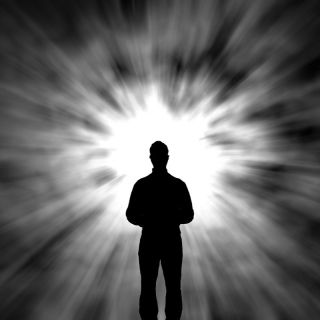Spirituality
Why Unexplainable Events Are Common as Loved Ones Die
"I sensed he'd died and was visiting people and places he knew."
Posted April 8, 2023 Reviewed by Tyler Woods
Key points
- Many unusual experiences are reported by people who witness or are connected to someone's death.
- These include spiritual experiences of elation, and profound altered states of consciousness.
- "Crisis apparitions" may occur when a person is not even aware that a relative or friend is close to death.
- Studies show that three-quarters of people have sensed the presence of a deceased loved one in some form.

This is the second post in a two-part series. You can read the first part here.
In my last post, I described unusual experiences that occur when people are close to death, including terminal lucidity and “death-bed visions” of relatives. In this article, I’m going to focus on unusual experiences reported by people who witness the deaths of others, or who are connected to a dying person.
As with the previous article, it’s not my purpose to discuss the evidential basis of these experiences, or what they might tell us about the nature of human consciousness, or of life itself. I simply want to highlight how common they are, and how meaningful—and even transformational—they can be.
Spiritual Experiences While Witnessing Death or Its Aftermath
Witnessing the death of a loved one is often a deeply distressing experience, but there are also many reports of profound positive experiences. I described my own experience at the beginning of the previous article. Sitting with my mother shortly after she had passed, the room glowed with white light, which grew brighter and seemed to submerge every object, including my mother’s body, while I felt a deep sense of calm.
A man named Nadim Ednan-Laperouse witnessed the death of his fifteen-year-old daughter, Natasha, following an allergic reaction to food. Paramedics tried to restart her heart, and Natasha recovered consciousness for a few seconds. But then her heartbeat faded again. At that point, Nadim looked up and saw five luminous figures—who he immediately thought of as angels—around his daughter’s body.
“These five angels just appeared, and with them, this yellow light, strong, soft yellow light, rather like candlelight but really intense,” he recalled. He sensed that they had to come to take his daughter away, which meant that she was about to die, and he waved them away, shouting, “This is not her time!” Then the beings disappeared. And at precisely that moment, Natasha died.
Nadim was an atheist, so his vision was especially startling. As he put it, “I am the least likely person to have a hallucination. I am not prone to [them]. I’ve always been calm and stalwart in moments of adversity.”
Powerful positive experiences are not uncommon at funerals, too. In my book, Extraordinary Awakenings, I tell the story of Suzy, whose husband was killed in a car accident. She described how, while she was initially distraught at the funeral, “By the second song, everything had changed. It felt like some force had come through me to make me strong, and I felt euphoric. Something had shifted and I felt powerful and in control.”1
Crisis Apparitions
Unusual experiences—known as "crisis apparitions"—can also occur when a person is not even aware that a friend or relative is close to death.
One evening during her vacation, a friend of mine was concerned about a member of their group who hadn’t returned to their youth hostel. He was a fellow runner and had set off that morning to run up a mountain. Suddenly, the man appeared, although not in his normal physical form. My friend saw him walking up the stairs of the hostel, then he “moved towards me, as though he was floating and with his arm outstretched, as though trying to reach out to me. I just sensed he had died and was visiting the people and places he knew as though trying to figure out where he was. I went downstairs to tell my boyfriend that I’d seen our friend and felt he had passed.” The next day, the man’s dead body was found on the mountain.
As well as visions, crisis apparitions can take the form of hearing the voice of a person around the time of their death, or strangely vivid dreams. For example, in an example collected by the researcher Ken Vincent, a woman described how her “aunt came to her in a dream and told her goodbye and that she had died. She woke up screaming and her phone was ringing. It was her sister telling her that her aunt had just died.”2
After-Death Communications
A feeling of connection to a deceased person may continue for months or even years after a person’s death.
In 1971, a Welsh doctor named William Dewi Rees was intrigued when elderly patients commented that they had sensed the presence of their deceased spouse. He made a systematic study of 293 widows and widowers in his group practice and found that almost half reported a “hallucination” (in his term) of their spouse. The majority felt that the visions were pleasant and helpful, and saw them as a normal part of the grieving process.3
Rees also found that only around a quarter of his participants had discussed their experiences before, which suggests a reticence that might even have affected his own study. Indeed, more recent studies have suggested that as many as three-quarters of bereaved individuals have sensed the presence of a deceased loved one. As with crisis apparitions, these “after-death communications” have different forms—not only visions, but also hearing or smelling the deceased person, being touched by them, or a powerful feeling that they are nearby, watching or helping.
As suggested earlier, I don’t have space here to debate the implications or validity of the experiences. However, I see them as a useful reminder that we should not, in the words of William James, “close our accounts with reality.” We should not make the mistake of believing that our normal view of reality is reality itself. Like any other animal’s, our awareness is selective and limited, so there must be ranges of phenomena and forces beyond those we normally perceive. In the wise words of Shakespeare, we should remember that “there are more things in heaven and earth than are dreamt of in [our] philosophy.”
Facebook/LinkedIn image: Ground Picture/Shutterstock
References
1, Taylor. S. (2021) Extraordinary Awakenings. https://www.stevenmtaylor.com/books/extraordinary-awakenings/
2. Ken Vincent, “Study of Evidential After-Death Communications,” De Numine 70, 2021, 4-6, 5.
3. William Dewi Rees, “The Hallucinations of Widowhood,” British Medical Journal, 4(5778), 1971, 37–41. https://doi.org/10.1136/bmj.4.5778.37




